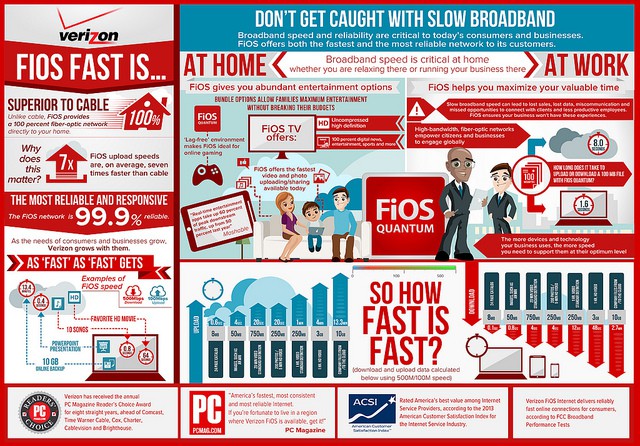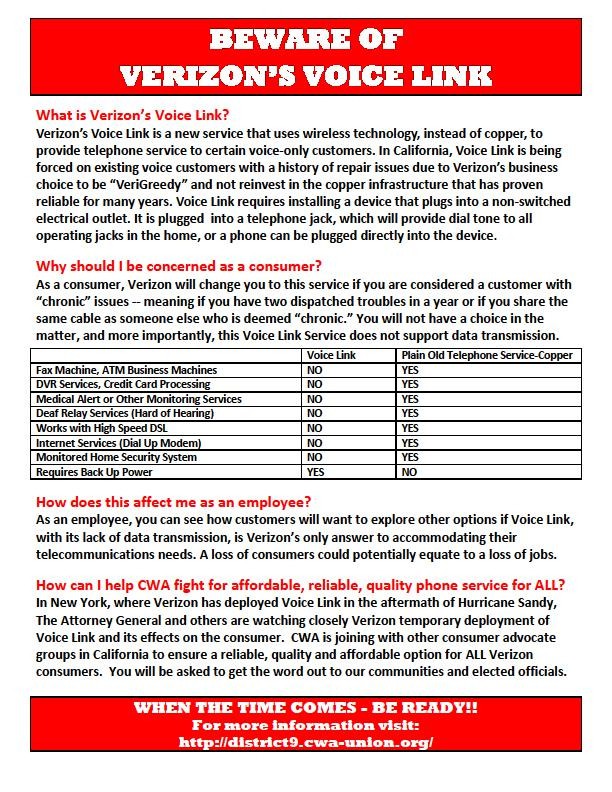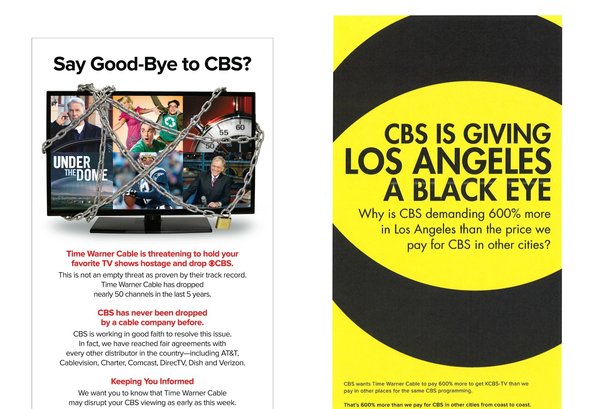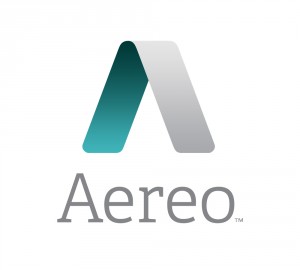Verizon is “redefining the power of the Internet” in select FiOS areas with the introduction of a new 500/100Mbps speed tier that blows away Time Warner Cable and leaves Cablevision and other competitors woefully behind.
Just weeks after Cablevision boosted upload speeds, Verizon has responded with service offerings up to a half gigabit in speed, telling customers FiOS Quantum 150/65Mbps, 300/65Mbps, and 500/100Mbps plans will “radically change everything you do online right now – and in the future.” It is ten times faster than the fastest service available from Time Warner Cable in the northeast: 50/5Mbps.

Verizon’s fastest broadband does not come cheap, however. The 500Mbps package starts at $294.99 a month for new customers with a two-year contract. Verizon Voice service is required to get the promotional price and a $165 early termination fee applies (reduced by $7.50 for each month a customer maintains service). A $59.99 activation and other fees, taxes, charges, and terms apply. Customers must also pass a credit check to avoid a deposit. Skip the contract and other requirements and the rate is only slightly more: $304.99 a month.
Verizon is charging nearly four times more than what Google charges for its twice as fast gigabit service. But analysts believe that Google will never venture into Verizon FiOS territory so price competition is unlikely in the near term. Cable operators that compete with Verizon would have to dedicate a considerable amount of bandwidth to best Verizon’s download speeds, and matching upstream speeds will be even more problematic unless and until cable operators transition their systems to all digital video to free up bandwidth.
But Verizon’s fastest Internet speeds are not available in all FiOS areas. The company warns “500/100Mbps service availability may be limited in your area based on network qualification requirements.”

Verizon’s competitors, which don’t have the benefit of an all-fiber network, continue to stress consumers simply don’t need any speeds faster than what they now offer. Frontier Communications believes most consumers do just fine with 6Mbps DSL. Verizon’s larger cable competitors range from Time Warner Cable, which does not even try to match its competitor’s fiber speeds, to Bright House, which competes with Verizon FiOS in Florida, to Comcast, which offers faster Internet service but regularly threatens to cap how much customers can use each month. Verizon FiOS has, in practical terms, no usage caps.
“For some, the discussion about the broadband Internet seems to begin and end on the issue of ‘gigabit’ access. The issue with such speed is really more about demand than supply. Most websites can’t deliver content as fast as current networks move, and most U.S. homes have routers that can’t support the speed already available.” — David Cohen, chief lobbyist, Comcast Corp., May 2013
“Residential customers, at this time, do not need the bandwidth offered with dedicated fiber – however, Bright House has led the industry in comprehensively deploying next-generation bandwidth services (DOCSIS 3.0) to its entire footprint in Florida – current speeds offered are 50Mbps with the ability to offer much higher. We provision our network according to our customers’ needs.” – Don Forbes, Bright House Networks, February 2011
[flv width=”640″ height=”380″]http://www.phillipdampier.com/video/Verizon FiOS Introduces 500Mbps 7-22-13.mp4[/flv]
Verizon FiOS introduces faster broadband speeds to help customers accomplish more of what they want to do online. Verizon’s Fowler Abercrombie says ‘it’s only the beginning’ as Verizon continues to innovate on its fiber to the home network. (2 minutes)


 Subscribe
Subscribe Despite warnings from public safety officials the wireless landline alternative proposed by Verizon is unreliable and potentially a threat to the safety and well-being of customers, Verizon is moving full speed ahead to deploy Voice Link service in New York and New Jersey communities where existing Verizon landlines have deteriorated and FiOS fiber optics is a distant dream.
Despite warnings from public safety officials the wireless landline alternative proposed by Verizon is unreliable and potentially a threat to the safety and well-being of customers, Verizon is moving full speed ahead to deploy Voice Link service in New York and New Jersey communities where existing Verizon landlines have deteriorated and FiOS fiber optics is a distant dream.


 Several million Time Warner Cable and Bright House customers in New York, California, Texas and Florida will lose CBS programming this Wednesday at 5pm if the three companies do not iron out their differences in contract renewal negotiations.
Several million Time Warner Cable and Bright House customers in New York, California, Texas and Florida will lose CBS programming this Wednesday at 5pm if the three companies do not iron out their differences in contract renewal negotiations. CBS wants to be paid at levels comparable to the most popular cable networks and believes the fact the network is now number one in the ratings delivers negotiating power. CBS has not made its aggressive position on carriage fees a secret. Executives have told investors it plans to quadruple cable and satellite fees over the next four years with a goal to raise an extra $1 billion. Wall Street analysts have recommended the stock to investors and its value has risen at least 65% in the past year.
CBS wants to be paid at levels comparable to the most popular cable networks and believes the fact the network is now number one in the ratings delivers negotiating power. CBS has not made its aggressive position on carriage fees a secret. Executives have told investors it plans to quadruple cable and satellite fees over the next four years with a goal to raise an extra $1 billion. Wall Street analysts have recommended the stock to investors and its value has risen at least 65% in the past year.


 For the third time, legal action from the four largest commercial television networks to shut online streaming service Aereo has been denied.
For the third time, legal action from the four largest commercial television networks to shut online streaming service Aereo has been denied.
 — $250,000 came from “Educators United,” an offshoot of the United Federation of Teachers.
— $250,000 came from “Educators United,” an offshoot of the United Federation of Teachers.